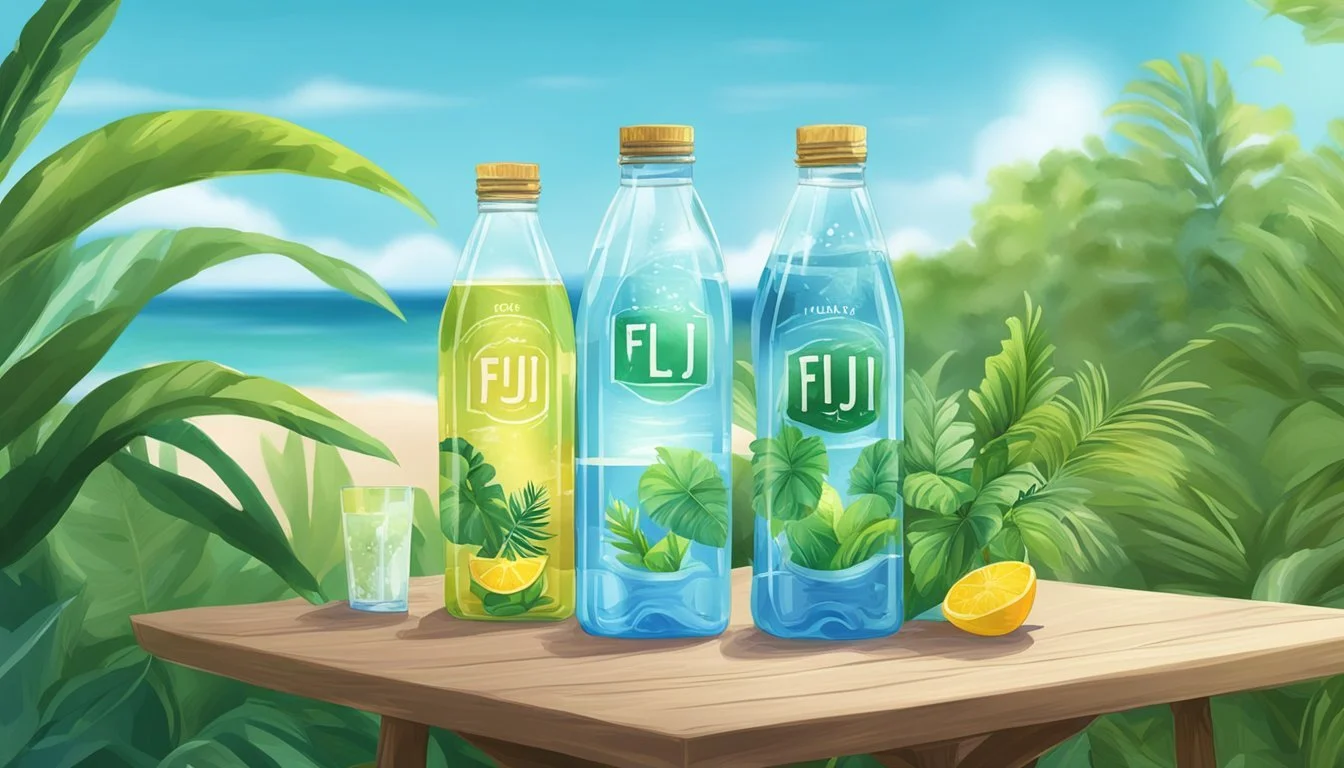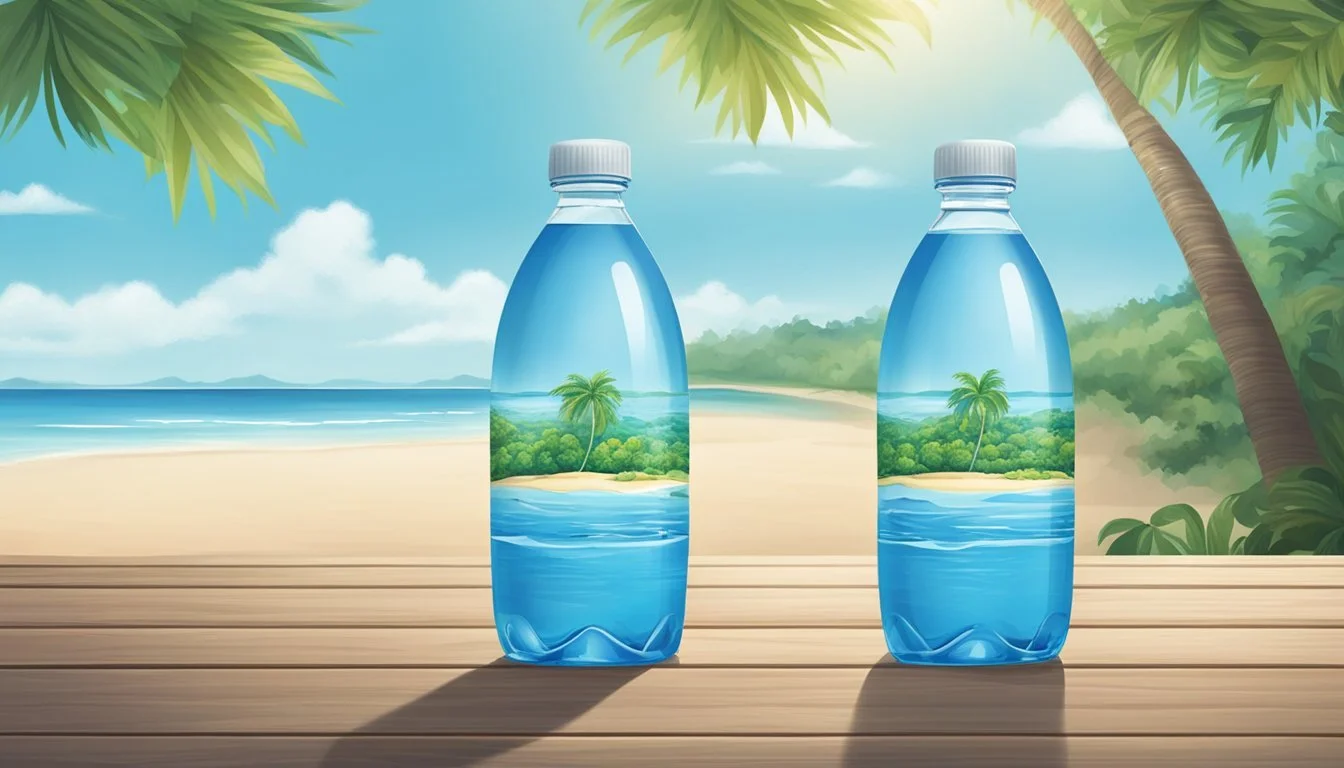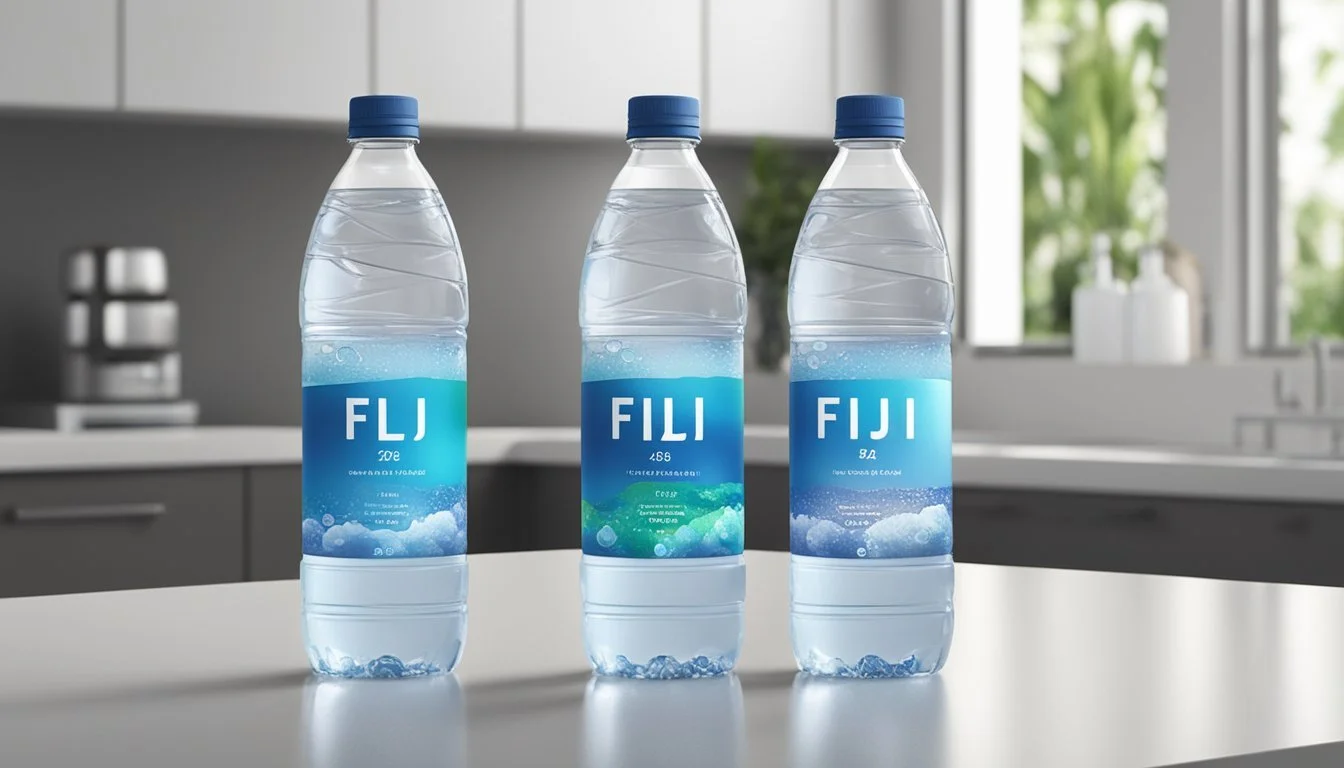Fiji vs. Starkey
A Clear Comparison of Bottled Water Quality
Comparing Fiji Water and Starkey Spring Water involves looking at various factors that appeal to many consumers, such as taste, sourcing, and environmental impact. Fiji Water, renowned for its natural artesian source, boasts a soft, smooth taste that many find refreshing. Starkey Spring Water, sourced from a geothermal spring in Idaho, offers a crisp, clean flavor that stands out among other brands.
When it comes to taste, many individuals prefer Fiji Water for its distinct smoothness, while Starkey is appreciated for its purity. Both brands have their unique points: Fiji's marketing emphasizes its island origins and mineral-rich content, while Starkey's appeal lies in its simplicity and commitment to natural sourcing.
Another important consideration is the environmental impact. Fiji Water often faces criticism for its use of single-use plastic bottles, whereas Starkey Spring Water also uses plastic but highlights its sustainable harvesting practices. Consumers keen on environmental sustainability might find this an essential aspect of their decision-making process.
Fiji Water: An Overview
Fiji Water, sourced from an untouched artesian aquifer in the Fiji Islands, is known for its unique mineral content and pristine quality. The brand emphasizes its natural purity, premium packaging, and efforts towards environmental sustainability.
Origin and Source
Fiji Water originates from a remote artesian aquifer in the Yaqara Valley on Viti Levu, Fiji’s largest island. The aquifer is shielded by layers of volcanic rock, which act as natural filters. This isolation preserves the water’s purity from pollutants. The artesian nature of the aquifer means that the water is naturally pressurized to rise to the surface when tapped, maintaining its untouched quality until bottling.
Bottling and Packaging
The bottling facility is strategically located near the aquifer to ensure minimal contamination. Fiji Water is bottled at the source in BPA-free plastic bottles. The unique square design of the bottle differentiates it from competitors and adds to its premium appeal. The water is bottled under sanitary conditions to maintain the same purity level as found in the aquifer, ensuring consistency in taste and quality.
Unique Composition and Mineral Content
Fiji Water boasts a distinct mineral profile, primarily due to the volcanic rock layers it filters through. It contains silica, calcium, magnesium, and bicarbonate, which contribute to its smooth, soft taste. The pH level of Fiji Water is slightly alkaline, typically around 7.7, which is often marketed as beneficial for balancing the body’s acidity. These minerals not only enhance flavor but are also essential for various bodily functions.
Environmental Impact and Sustainability Efforts
Fiji Water’s use of single-use plastic bottles has raised environmental concerns. However, the company has made strides to reduce its carbon footprint. Initiatives include reducing plastic content in bottles, investing in renewable energy, and maintaining sustainable water practices. Despite these efforts, the environmental impact of plastic pollution remains a critical issue. Fiji Water focuses on balancing its premium product appeal with ongoing sustainability efforts.
Each section of Fiji Water's operations, from its source to its end consumer, highlights the commitment to maintaining high standards and addressing environmental challenges.
Starkey Water: Behind the Label
Starkey Water represents a commitment to purity, quality, and environmental responsibility. The following sections explore its source, testing standards, packaging choices, and efforts towards sustainability.
Sourcing and Purity
Starkey Water is sourced from an artesian aquifer located in Idaho. This underground water supply is naturally protected from contaminants. This pristine source is a significant factor in the water's high purity levels.
The water undergoes minimal processing, aiming to maintain its natural mineral composition. By preserving its original characteristics, Starkey offers a pure drinking experience.
Quality and Testing
Quality is paramount for Starkey Water. The water is rigorously tested for various contaminants, including heavy metals. The company adheres to stringent standards to ensure safety.
Testing includes checks for purity, mineral content, and potential pollutants. Frequent laboratory analyses help in maintaining the water's premium quality. Documented results are often made available for consumer transparency.
Packaging Choices
Starkey Water is offered in glass bottles, a choice that enhances its premium perception. Glass is preferred for its non-reactive nature, ensuring that the water's purity is preserved.
Glass packaging also makes the water appear more upscale compared to plastic alternatives. This choice resonates with consumers who are increasingly concerned about health and safety.
Environmental Responsibility
Starkey's packaging choices reflect their commitment to environmental responsibility. Glass bottles are more recyclable compared to single-use plastics. This reduces the environmental impact and supports sustainability.
The company also promotes recycling initiatives, encouraging customers to recycle used bottles. By aligning with environmentally friendly practices, Starkey aims to reduce its carbon footprint and contribute to a greener planet.
Comparative Taste Analysis
Fiji Water and Starkey Water offer distinct taste profiles influenced by their sources and mineral compositions. This section examines the findings from taste tests and explores consumer preferences.
Taste Test Findings
Fiji Water is known for its smooth and soft taste, which comes from its source in an artesian aquifer in Viti Levu, Fiji. It has a unique mineral profile, including silica, which contributes to its clean, crisp flavor.
Starkey Water, sourced from a geothermal spring in Idaho, USA, offers a contrasting taste profile. It has a slightly alkaline pH and contains naturally occurring electrolytes like calcium, magnesium, and silica. These elements provide a distinct minerally taste, appreciated by some for its refreshing qualities.
Blind taste tests often explore these differences. Participants commonly describe Fiji Water as having a silky mouthfeel and neutral taste, while Starkey Water is noted for its more robust, mineral-rich flavor. The presence of electrolytes in Starkey Water can enhance hydration, appealing to those looking for functional benefits alongside taste.
Consumer Preferences
Consumer preferences vary significantly when comparing these two brands. Some individuals prioritize the smooth and neutral taste of Fiji Water, finding it more palatable for everyday consumption. Its reputation as a premium water brand also influences consumer choice, often seen as a status symbol.
Starkey Water appeals to those looking for functional beverages with added health benefits. The presence of natural electrolytes makes it a popular choice among athletes and health-conscious consumers. The distinctive minerally taste of Starkey Water, however, can be polarizing.
Research and taste tests reveal that individual taste preferences play a crucial role in determining which water consumers favor. Personal health goals, such as electrolyte intake and hydration needs, also influence these preferences, shaping the market demand for both brands.
Health and Hydration Factors
Fiji and Starkey waters offer unique benefits regarding hydration and overall health. This section explores their hydration and electrolyte content, health benefits of the minerals they provide, and the safety standards they adhere to.
Hydration and Electrolytes
Fiji Water and Starkey Water effectively support hydration due to their balanced mineral content.
Fiji Water contains a distinctive blend of electrolytes such as calcium, magnesium, and silica sourced from its volcanic origins. These minerals can enhance hydration by facilitating water absorption in cells.
Starkey Water is known for its alkaline properties, having a pH level of 9.6. High pH levels might aid in reducing acidity in the body, potentially offering better hydration to individuals needing pH-balancing properties. However, it contains lower mineral content compared to Fiji.
Both brands provide essential hydration but cater to different preferences regarding electrolyte balance and pH levels.
Health Benefits of Mineral Water
Mineral water offers various health benefits thanks to its essential mineral content.
Fiji Water is rich in silica, which is linked to skin health and other physiological functions. The calcium and magnesium in it support bone density and muscle function.
Starkey Water, with its high pH, could potentially benefit those looking to neutralize acidity and improve hydration. Although its mineral content is lower, it contains beneficial amounts of calcium and magnesium that promote nerve function and metabolism.
Both Fiji and Starkey waters provide health benefits, though Fiji’s may be more aligned with those seeking mineral-rich water for daily health maintenance.
Safety Standards and Regulations
Ensuring bottled water safety is crucial, and both Fiji and Starkey adhere to strict standards.
Fiji Water is bottled at the source in a facility approved by the FDA and is stored in single-use plastic bottles, raising some concerns about endocrine-disrupting chemicals.
Starkey Water also complies with FDA regulations and undergoes regular testing to ensure its purity and safety. Starkey’s product is packaged in glass bottles, which may be appealing to those wary of plastic.
Both brands meet stringent safety guidelines, ensuring the consumer receives safe drinking water.
Cost and Affordability
Fiji and Starkey waters differ significantly in terms of cost and market presence. Examining the pricing and availability reveals vital insights for consumers.
Premium Brand Pricing
Fiji Water typically retails for about $2.00 to $2.50 for a 500ml bottle. This premium pricing reflects its branding as a luxurious water sourced from a natural underground aquifer in Fiji.
In contrast, Starkey Water is also positioned as a premium brand but usually costs slightly less, around $1.80 to $2.20 for a 500ml bottle. Both brands justify their higher prices with claims of superior purity and taste, appealing to consumers seeking high-quality bottled water.
Benefits:
Consumer perception of luxury
High-quality water sources
Considerations:
Higher cost per bottle
Market Availability
When it comes to market availability, Fiji Water boasts a wider presence, being sold in various retail channels like supermarkets, convenience stores, and online platforms. Their global distribution network makes it easy for consumers to purchase.
Starkey Water has a more niche market presence, often found in health food stores and specialty retailers. It may not be as widely available as Fiji, leading consumers to sometimes opt for more readily accessible brands.
Advantages:
Fiji: Greater accessibility
Starkey: Available in specialized health markets
Challenges:
Starkey: Less widespread availability
Environmental Considerations and Impact
Both Fiji and Starkey bottled waters have environmental implications that consumers should be aware of, including carbon emissions and packaging choices.
Carbon Footprint of Bottled Water
The production, transportation, and disposal of bottled water contribute significantly to carbon emissions. Fiji Water, sourced from the remote islands of Fiji, has a larger carbon footprint due to long-distance shipping.
In contrast, Starkey Water, sourced domestically within the U.S., generally entails fewer transportation emissions. Both companies face scrutiny for the carbon-intensive processes involved in bottling and distribution.
Sustainable Practices in Bottling
Fiji Water has taken steps to reduce its environmental impact by investing in renewable energy and promoting water conservation at its source. They have initiated programs aimed at offsetting their carbon emissions.
Starkey Water emphasizes local sourcing and sustainable bottling practices. By utilizing facilities closer to their major markets, they reduce transportation-related emissions. Both brands also support various water preservation projects.
Eco-Friendly Packaging Innovations
The reliance on single-use plastic is a major environmental concern. Fiji Water packages in PET plastic, which is recyclable but often ends up in landfills or oceans, causing pollution. They have made commitments to use more recycled content in their bottles.
Starkey Water also uses recyclable materials and explores biodegradable packaging options. Both brands aim to innovate in eco-friendly packaging, but the effectiveness of these initiatives varies. Efforts in reducing single-use plastic and improving recycling rates are critical for environmental sustainability.
Brand Image and Consumer Trust
Both Fiji and Starkey have garnered significant attention in the bottled water market, but their brand image and consumer trust present distinctive characteristics worth noting. Here’s a breakdown of how each brand fares with consumers.
Net Favorability Rating
Fiji Water consistently enjoys a high net favorability rating due to its association with pristine natural sources and premium quality. Consumers often view Fiji as a luxury brand, which bolsters its favorable perception. Surveys have shown that consumers rate Fiji highly for taste and purity.
Starkey, while respected, doesn’t reach the same favorability heights. Starkey's focus on therapeutic benefits from its mineral-rich composition appeals to a niche health-conscious demographic. This specialized appeal gives it a solid, though more modest, net favorability rating compared to Fiji.
Brand Reputation and Recognition
Fiji Water boasts strong brand recognition globally. Its marketing emphasizes the untouched origins of its water from Viti Levu in Fiji, leveraging exotic imagery and celebrity endorsements to enhance its premium reputation. This strategy has entrenched Fiji in the minds of consumers as a top-tier, high-quality water brand.
Starkey's reputation hinges on its historical and geological roots. Extracted from a deep thermal aquifer in Idaho, Starkey markets itself as a more health-oriented choice. Although it lacks the same global recognition as Fiji, Starkey has carved out a niche due to its unique source and mineral benefits. This brand positioning aids in building trust among health-focused consumers.
More About Fiji
Fiji vs Mountain Valley Spring Water: Which Bottled Water is Better?
Fiji vs Whole Foods Italian Still Mineral water: Which Bottled Water is Better?
More About Starkey
Icelandic Glacial vs Starkey: Which Bottled Water is Better?
Mountain Valley Spring Water vs Starkey: Which Bottled Water is Better?
Starkey vs Kirkland Signature: Which Bottled Water is Better?
Starkey vs Richard's Rainwater: Which Bottled Water is Better?
Starkey vs Whole Foods Italian Still Mineral water: Which Bottled Water is Better?






